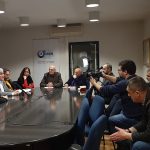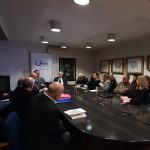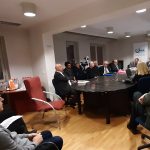THE EIGHTH SARAJEVO UN WORLD INTERFAITH HARMONY WEEK
EIGHTH SARAJEVO UN WORLD INTERFAITH HARMONY WEEK February 3–7, 2020 Public Discussion Religious Pluralism in Bosnia: Past, Present, and Future February 5 (Wednesday), at 18:00, IFB premises On Wednesday, February 5, 2020, International Forum Bosnia held a lively and well-attended public discussion on the theme of Religious Pluralism in Bosnia: Past, Present, and Future at its premises (ul. Sime Milutinovi?a Sarajlije 10/III). The discussion began at 18:00 and lasted to 21:00. The topic of this debate was the development of an adequate approach to religious pluralism in Bosnia that reflects the fact that religious identity necessarily has both a public and a private aspect. Nationalism and Communism tend to want a public sphere that is closed to the free expression of religious identity, whether by proscribing or foreclosing healthy interfaith discussion. A brief opening statement by the moderator, Asim Zub?evi?, was followed by an introductory discussion on Religious Pluralism in Bosnia by Prof. Rusmir Mahmut?ehaji?, Prof. Krsto Mijanovi? and Prof. Mile Babi?, who presented their analyses of how the political parties in the country have attempted to close off the public sphere and deploy religious identity and symbolism in the service of political and social division and the creation of closed and mutually opposed communities. In this way, in the words of Professor Babi?, the parties promote a politics of egoism and cult of national idols rather than openness to the transcendent and so to our fellow humans as instances of the divine. The discussion was followed by 8 short presentations. The first to speak was Prof. Ivo Markovi? on Anti-semitism and Interfaith Relations, in which he drew upon his extensive experience as founder and director of the interfaith Pontanima choir and as a Franciscan. Next to speak was Prof. Mehmedalija Hadži? on the topic of Can a path to human self-realisation be found that does not presuppose the full openness of Sacred Scripture to interpretation, during which he presented his personal experience of the Recitation and meditation on its meaning as a source of self-realisation. Dr. Mehmed Kardaš discussed Religious pluralism in Bosnia and Bosnian Mediaeval Literature: impressions from palaeographical research, with a particular focus on the ways in which the different ethnicised political constituencies attempt to anachronistically coopt mediaeval history and cultural heritage for their narratives. Prof. Enes Kujundži? spoke On the pluralism of literacy and writing systems in 19th century Bosnia, with a particular focus on the history of the first printing press in the city and the variety of types it used and so of book production in 19th century Sarajevo. Prof. Mirsad Kuni? spoke on Interfaith relations in Bosniak epic, explaining the institution of cross-faith blood-brotherhood in epic narratives. Desmond Maurer talked on the Transformation of religious symbols within modern political ideologies, arguing that while this often represents a corruption of political theology, one can only engage with it if one takes seriously the irreducible connection between the political and the religious as the twin pillars of a just order. Prof. Lejla Nakaš presented The Venetian Miscelleany and its place in Mediaeval Bosnian Literature, with a brief presentation of the significance of Old Testament references in its version of the Acts of the Apostles for our understanding of the allegedly dualistic nature of the mediaeval Bosnian Church and so of the role of dualistic heresy in Bosnia’s religious history. Finally, Erma Rami?-Kuni? presented preliminary results of her researches into The Goražde Printing House and its Place in Bosnian Culture, explaining the history and signficance of the first, early 16th century, printing press in Bosnia and the strange neglect its has suffered not just in Bosnian historiography, but in Balkan and Ottoman historiography more widely. Unfortunately, Prof David Kamhi was not able to attend and deliver his planned talk on The importance of religion for the creation of Jewish identity. The discussion was followed by a half-hour discussion of the various papers presented. Public Discussion Some important recent books for understanding religious pluralism in Bosnia: Judaism, the Divoš Gospels, and The Vision of Islam February 7 (Friday), at 18:00, IFB premises On Friday, February 7, 2020, International Forum Bosnia held a successful public discussion on Some important recent books for understanding religious pluralism in Bosnia at its premises (ul. Sime Milutinovi?a Sarajlije 10/III). The discussion began at 18:00 and lasted until 20:00. The organiser organised this meeting to discuss three books that offer insights relevant to contemporary religious pluralism in Bosnia in a global context, one on the position of Judaism in today’s world from a Catholic perspective, the second on Bosnia’s mediaeval cultural and religious heritage, and the third on a new Bosnian translation of a classic treatment of and introduction to traditional and contemporary Islam. The books in question are Hans Küng, Judaism: Between Yesterday and Tomorrow (trans. John Bowden, New York: Continuum, 1992); Lejla Nakaš, Divoševo evan?elje: Studija i kriti?ko izdanje teksta (Sarajevo, Institut za jezik, 2019) and Sachiko Murata and William Chitick, Vizija islama: Temelji muslimanske vjere i prakse (trans. Amila Karahasanovi?, Sarajevo: Connectum: 2019). In Judaism: Between Yesterday and Tomorrow, a companion to his books on Christianity and Islam, Hans Küng sets out the need for a global ethics based upon knowledge of the metaphysically grounded traditions as a precondition to world peace. He argues forcefully for the view that a knowledge and affirmation of Judaism is a necessary element of any global ethics and so a component of a religious mosaic, no element of which can be treated adequately in isolation. Jakob Finci presented the book and the value of its insights into Judaism, Christianity, and Islam and the various ways they relate to each other, with a particular focus on improving our understanding of the political, cultural, and economic situation in Bosnia as a complex unity that can only survive as a vital pluralism. Ema Mazrak discussed the Divoš Gospels and their calligraphy and illumination within their historical context. The Divoš Gospels are a major manuscript treasure of Bosnia’s religious past whose calligraphy and illumination bear convincing testimony to the quality of Bosnian sacral art. The manuscript most likely dates from the first half of the 14th century. This new edition makes the work and recent research on it available to the general public in Bosnia and beyond. According to Dr. Mazrak, the current state of research does not suggest any clear parallels to the Divoš Gospels’ illuminations, but does raise the possibility of comparisons with a manuscript from Athens, whose scribe and illuminator was probably of Slavic origins. The Vision of Islam is considered by many to be the most complete currently available presentation of the beliefs and practices derived from the Qur’anic revelation and the example of its first recipient. The book offers a comprehensive overview of that tradition and its universal significance. It has been translated into many languages. Samir Beglerovi? presented the new Bosnian translation, relating it to contemporary currents in Bosnian culture, exploring similarities and differences. Such an understanding of Islam, fully contemporary and simultaneously grounded in tradition and open to dialogue with the other traditions, is a precondition for the development of harmonious interfaith and social relations in the country. Rasim Ga?anovi? chaired the discussion, which was well attended by members and friends of International Forum Bosnia. The discussion was organised in International Forum Bosnia as part of its programme to mark UN World Interfaith Harmony Week in Sarajevo. Fatima Veispahi? IFB Press



